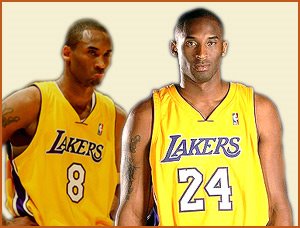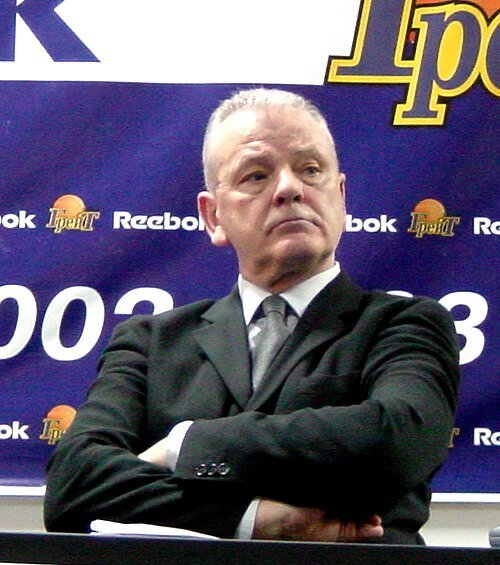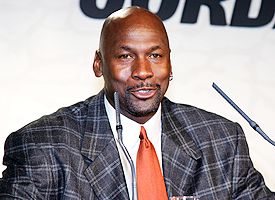By Michael Luo
The Associated Press
Manute Bol lopes across the lawn toward his house, covering the distance in a few, giant strides.
 At 42, Bol's joints ache from rheumatism, but he still carries his 7-foot-7-inch frame erect and proud. His face is a little fuller than it was during his years in the National Basketball Association, when his celebrity and singular ability to block shots earned him millions.
At 42, Bol's joints ache from rheumatism, but he still carries his 7-foot-7-inch frame erect and proud. His face is a little fuller than it was during his years in the National Basketball Association, when his celebrity and singular ability to block shots earned him millions.
The money is gone now. His house is sparsely furnished; the furniture, slightly ragged. The rent is paid by Catholic Charities, a group that helps political refugees. That's what Bol is now.
He moved to West Hartford with his wife, son and half-sister a few months ago, having finally made the painful decision to leave behind the Sudanese homeland that he loved but could not find a place in anymore. He made a daring escape, complicated by the Sept. 11 attacks.
Bol never forgot Sudan during the years of wealth and fame. He couldn't, he says.
That cost him nearly everything.
'God gave this to me'
Manute Bol was born in Turalie, a remote village in the southern part of Sudan, a nation where, over the past 18 years, civil war has left almost 2 million people dead. Most casualties have been in the south, where Christian and animist rebels battle a northern Islamic government, based in Khartoum.
Southern Sudan is the home of the Dinkas, the tallest people in the world and Bol's tribe.
With a flat-footed reach of 10 feet, 6 inches, Bol is so tall that the average man comes up to his rib cage. His inseam measures nearly 5 feet, and he wears size-16-1/2 sneakers.
He can drive a car only if its front seat is removed. The first time he tried to dunk a basketball, he smashed his face on the rim and lost two teeth. Bol was the tallest man to ever play in the NBA, until Gheorghe Muresan, a Romanian with a pituitary gland condition, beat him out by a few millimeters.
"God gave this to me," Bol says.
 His grandfather, Bol Chol, reputed to be 7 feet, 10 inches, was a powerful chieftain and had 40 wives. Bol's father, Madut Bol, was only 6-foot-8, but had seven wives and a large cattle herd — a sign of great wealth. His second wife, Okwok, was 6-foot-10. After having stillborn twins twice, she gave birth to Manute, whose name means "blessing from God."
His grandfather, Bol Chol, reputed to be 7 feet, 10 inches, was a powerful chieftain and had 40 wives. Bol's father, Madut Bol, was only 6-foot-8, but had seven wives and a large cattle herd — a sign of great wealth. His second wife, Okwok, was 6-foot-10. After having stillborn twins twice, she gave birth to Manute, whose name means "blessing from God."
Unlike his city-dwelling cousins, Bol never went to school; instead, he herded goats and cattle. When he came of age, he went through the manhood rituals: his front bottom-row teeth were pried out, and deep incisions were made around his head with a knife.
When he was 15, at the suggestion of relatives, he gave basketball a try. Bol walked three days from his village to join his first team.
A U.S. college basketball coach, in Sudan for a summer, learned of the tall athlete and arranged for Bol and a translator friend to fly to the United States in 1982. At one point, he decided to go home, thinking other students were laughing at him in an English-language class.
"I actually packed my bags and was going to the bus," he recalls.
Persuaded to stay, Bol wound up at the University of Bridgeport. Games at the small Connecticut school's 1,800-seat gymnasium suddenly became packed, frenzied events.
Bol blocked 15 shots in one game and averaged 22.5 points. He was Division II All-America.
After one year at Bridgeport, Bol joined the Rhode Island Gulls, a pro team in the United States Basketball League. He was picked up by the Washington Bullets in the NBA draft a few months later.
Many speculated that Bol's 205-pound frame couldn't take the wear and tear of the NBA. But Bol ran away with the league title in blocked shots with 397 in 1985, the second-highest total in league history.
Over the next 10 years, Bol cycled through four teams: the Bullets, the Golden State Warriors, the Philadelphia 76ers and the Miami Heat.
Bol essentially was a one-dimensional player, averaging 2.6 points and 4.2 rebounds a game, but he lived the NBA high life, making $1.6 million a year at one point and owning homes in Maryland, Khartoum and Egypt. He opened a restaurant with a $500,000 investment, only to see it go bankrupt. He drove luxury cars and had endorsement contracts with Kodak, Nike and Toyota.
His loopy sense of humor and accented trash talking, full of hilarious malapropisms, made him popular among teammates. But he remained a stranger in his adopted land.
A knee injury in 1994 relegated Bol briefly to the Continental Basketball Association and then to a league in Italy. It seemed he would just retire and enjoy his earnings.
But his heart was still in Sudan.
Accusations of betrayal
Bol visited his native country regularly — nearly every summer during his NBA career.
On one of his early trips, he met and married his first wife, Atong, then 18, a southern Sudanese refugee.
Starting in 1991, Bol began making visits to southern Sudanese refugee camps. Many of Bol's relatives were leaders in the Sudanese People's Liberation Army (SPLA), the rebel movement.
He became an important backer of the rebels, contributing an estimated $3.5 million. Bol and his cousin Ed Bona, a former college basketball player at Fordham, met with dozens of members of Congress, warning of Muslim extremists and begging for U.S. intervention. They picketed the Sudanese embassy.
Hope came in 1996, when a group of southern Sudanese split from the SPLA to sign a cease-fire with the government. A leader of the splinter group invited Bol to join a government delegation in talks with the SPLA in Kenya.
Despite accusations of betrayal, Bol flew to Nairobi.
"I thought I should go and support the peace initiative," he says.
Talks collapsed two weeks later.
Bol returned to Khartoum, where the government, promising more talks, offered him a post as minister of sport. Their offer was conditional, however. He would need to become a Muslim first. A Christian since childhood, Bol refused.
As time passed with no progress toward peace, Bol began to feel used. He told refugees that there was hope, even though he didn't think so.
"I have to say it for my safety," he says.
A lone bright spot was his second marriage, to Ajok, a tall 21-year-old. (Bol's first marriage had soured. Atong remarried and moved to New Jersey with their four children.) Bol met Ajok through her father, an SPLA leader. In the Dinka tradition, Bol paid 150 cows for her. They soon had a son, Bol Manute.
In August 1998, Bol was sitting on his roof in Khartoum to escape the heat when an explosion one-half mile away lit up the night sky, followed by 15 to 20 more.
President Clinton had ordered the cruise-missile strike on a Sudanese pharmaceutical plant suspected of aiding the manufacture of chemical weapons. It was retaliation for the bombings of U.S. embassies in Kenya and Tanzania, linked by U.S. officials to Osama bin Laden and his al-Qaida network.
The attack was a turning point for Bol. The government accused him of being a spy, he says.
He tried to leave in 1999, but the government stopped him. His money dwindled as he supported himself and 20 relatives.
On his second attempt in 2001, Bol marched to the immigration office and demanded an exit visa. An officer told him to come back with a bribe.
Bol peddled his furniture. In Connecticut, friends swung into action, shipping plane tickets to Bol via a travel agent in Khartoum.
In July 2001, Bol, his wife, son and half-sister, Achuil, then 9, flew to Cairo, with the idea of going on to the United States.
In Egypt, U.S. consulate officials explained he needed to apply for refugee status if he wanted to bring his entire family. Bol settled in to wait.
Then came Sept. 11. Bol thought of the warnings he had given to members of Congress on Islamic extremism. Bol's family departed for Hartford on March 7, nearly six months after his arrival.
Today, friends are shopping around a screenplay on Bol's life in two very different worlds.
He has made a few public appearances, for small fees, and plans to petition the NBA to give him an advance on his NBA pension, roughly $24,000 a year.
'Celebrity Boxing'
His height remains an access pass — and his strange celebrity was underscored in one especially strange event.
Fox TV's "Celebrity Boxing" show invited him to fight another oversized athlete from an earlier era, former NFL lineman William "The Refrigerator" Perry.
Bol agreed to fight, if Fox agreed to air a toll-free number for the Ring True Foundation, a West Hartford-based charity he set up to benefit southern Sudanese children. He donated his $35,000 fee to the group.
Fight day was odd in many ways. Other "boxers," such as Joey Buttafuoco and Darva Conger, stopped by Bol's dressing room to have their picture taken.
Bol's trainer told him to keep his distance from Perry. But Bol went after him — and won the fight.
Manute Bol doesn't mind being a spectacle, he says, as long as it means helping his people.
Although relieved to be out of Sudan, he dreams of returning home. His ideal retirement would be split between the countries he's called home.
"I want my country to be like this some day," he says. "This is my dream."






